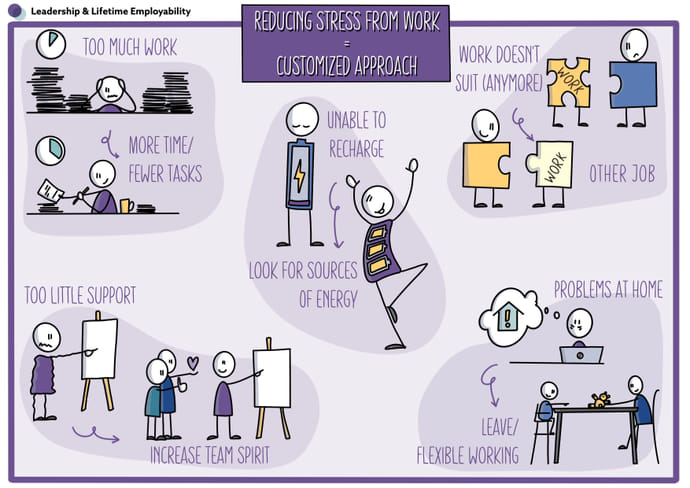Pressure of work is not the same thing as being busy
The term pressure of work can create confusion, because it does not have much to do with "being busy" but rather "feeling pressure". There are employees who thrive on being busy and merrily deal with one task after another, while others struggle daily with the same amount of work.
So pressure of work only applies when someone is unable to finish their work within the time available, or they can no longer meet the requirements of the job. If this situation goes on for too long, then they can get stressed which in turn can lead to absenteeism. So it is important that you flag up early if one of your employees is experiencing high pressure of work.
Signs that may indicate high pressure of work:
- someone is tired more and more often, and makes a listless, disinterested impression;
- someone is working later more and more often and frequently works through breaks;
- productivity drops, the quality of the work falls off, the work is unfinished, or finished late;
- the person has a cynical attitude and is resistant to change;
- the person seems dissatisfied, and quickly becomes irritated or emotional;
- there is an increase in physical ailments that don't seem to heal;
- the person more frequently reports sick for short periods.
How to detect pressure of work if your employees are working remotely
Are you managing remotely, maybe because your team members work mainly from home? Then you will probably still notice if the quality of their work falls off or if deadlines are constantly missed. But you will likely not notice irritation and emotional outbursts so much. And there is every chance that someone will not report sick because they are already at home, and out of sight. In this situation it is also very important to keep asking regularly – one on one and giving them your full attention – how someone is feeling. Don't be fobbed off too easily with "I'm fine", dig deeper. Do they still believe in what they are doing? What about enjoying their work? How is their private life? Can you help anyone? You will find some more tips on a good discussion here.
Reducing pressure of work = something different every time
Someone who is feeling heavy pressure of work feels overloaded. If you notice this, then start a conversation with your employee and work out together where the cause lies. It may be that the volume of work really is too great for the number of hours the employee has to do it. In this case, look to reduce the number of tasks. It may also be the case that someone is doing work that is not (or no longer) necessary. In this case, look to change their workload.
Sometimes this is not the solution and does not lead to the person focussing on their work. In this case, look where this employee derives their energy from, and how you can use these sources of energy more actively. In this case you are relying on increasing their resilience and their psychological capital.
Support from managers and colleagues is also essential to reducing the feeling of pressure of work. A good working atmosphere, team spirit and being involved in what is going on, these are some of the things that act as sources of energy. Sometimes it may help an employee to (temporarily) work less; then he can take advantage of the Flexible Working Hours law.
Legal rights and obligations with heavy pressure of work
Pressure of work is a form of psychosocial workload that can lead to stress. The Health and Safety Law says that employers must ensure that employers are not put under stress from excessive pressure of work and that they must remove or reduce the risk of this. This risk also needs to be included in the risk inventory and evaluation (RI&E). The resulting plan to tackle this must include measures to prevent pressure of work.
The law referred to above on Flexible working hours states that an employee can ask for an adjustment to their working schedule or their hours. The employer can only reject this request if there are compelling reasons to do so. For example, if this would create financial problems for the employer.